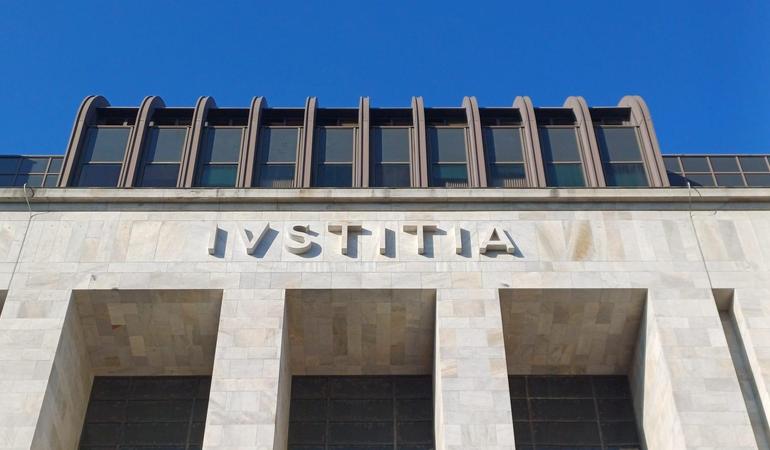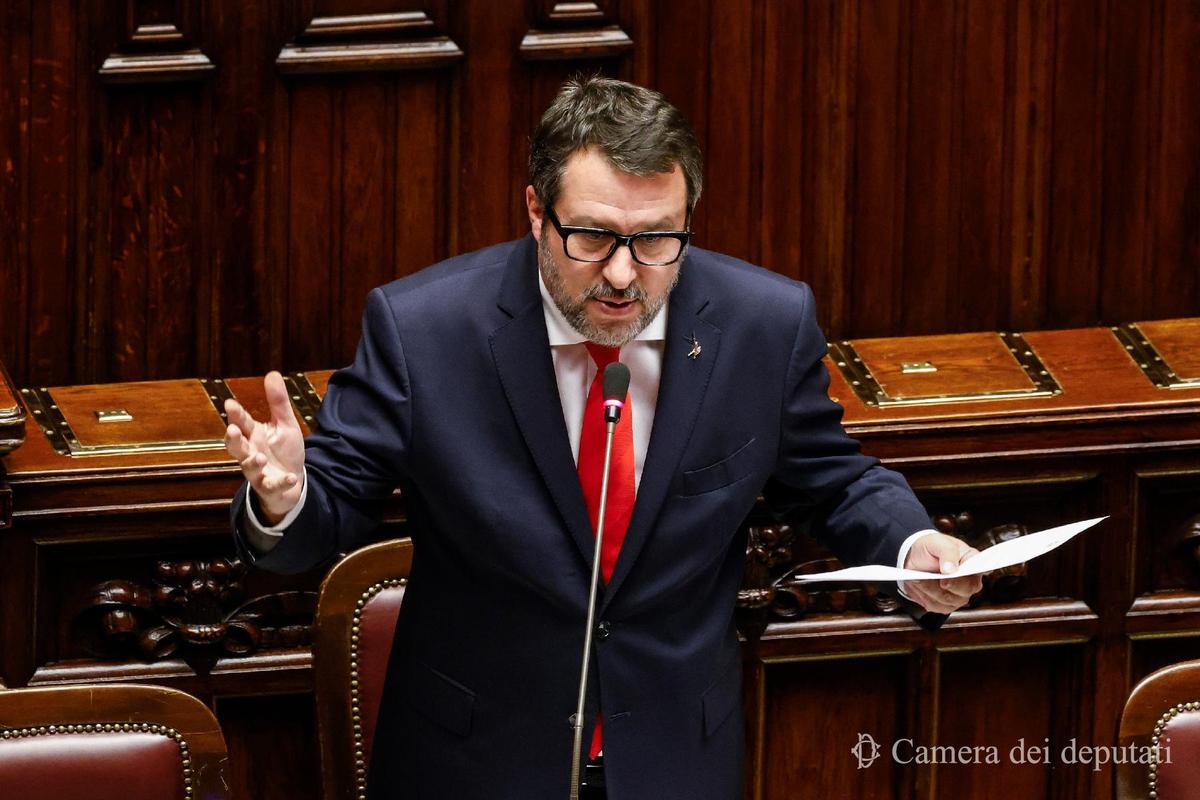
Hydra, a Milano il processo contro l'alleanza tra mafiosi di Cosa nostra, 'ndrangheta e camorra


27 settembre 2024
"We are going to seek the conviction of the defendant to defend the boundaries. The boundaries of law'. This is how Palermo's assistant prosecutor Marzia Sabella announced on Saturday 14 September the request for a six-year prison sentence against Matteo Salvini, the Italian policitian and minister accused on charges of having prevented for 19 days the disembarkation of the 147 migrants rescued by the Open Arms ship in August 2019.
In the 237 pages that make up the closing memorandum, the prosecution reconstructed in detail the facts of those 19 days, illustrated the legal framework that applies to the case and set out the elements that lead the prosecution to consider the conduct of the then Minister of the Interior illegitimate.
On 1 August 2019, the humanitarian ship Open Arms, flying the Spanish flag and serving the Spanish NGO Proactiva Open Arms, rescued a boat in distress off the coast of Libya, bringing 55 people to safety and alerting the Libyan, Italian and Maltese authorities. A few hours later, the then Interior Minister Matteo Salvini ordered the 'ban on entry, transit and stopover in the national territorial sea' against the Open Arms by a decree countersigned by the Defence and Transport Ministers.
In the following days, the ship carried out two more rescues, constantly informing the authorities and sending several requests for disembarkation in a safe port(place of safety), which were not accepted by the Ministry of the Interior despite the decision of the Lazio Regional Administrative Court to suspend the entry ban. Beyond a few medical evacuations and the disembarkation of minors (which Salvini, however, obstructed for a long time), the migrants will be forced to remain on board the Open Arms, in increasingly precarious sanitary and psychological conditions, until, on 20 August 2019, the Agrigento public prosecutor's office orders its seizure, thus allowing it to be disembarked in Lampedusa.
Asylum and migration, what the new EU pact provides
Minister Salvini is entered in the register of suspects of the Agrigento prosecutor's office in November 2019 and in July of the following year, the Senate authorises the Palermo court to proceed, a necessary step when ministers are charged for any offences committed in the exercise of their functions. There are two offences charged against Salvini:
For the first offence, the penalties range from six months to eight years, and from one to ten years if committed by a public official with abuse of the powers pertaining to his functions. For the second, penalties range from six months to two years' imprisonment.
Drones in Niger and radar in the Mediterranean: EU spends billions on high-tech borders
The prosecutor's indictment reports the framework now shared and consolidated in international law about 'the universal obligation to save human lives, without importance being attached to the area of the sea in which the need for a functional intervention for rescue arises and whether the action is carried out by state or private means'.
Of particular relevance are:
It is precisely on the Convention on the Law of the Sea that Salvini relied to justify the entry ban, as this allows for the safe passage of ships. According to the minister, however, the activity of Open Arms would be 'not inoffensive' because it was 'aimed at transferring irregular migrants to Italian territory in violation of the laws in force on immigration, who also lacked identity documents and came in part from foreign countries at risk of terrorism'. This theory was rejected by the prosecutors, according to whom 'so far it has never been demonstrated, in any of the criminal proceedings on the subject, a criminal role of the NGOs engaged in rescue operations at sea', nor 'were there any concrete elements of risk linked to international terrorism'.
On the contrary, according to the magistrates, Open Arms acted 'in accordance with the obligations imposed on ship captains by international law and navigation'. And if there has been 'loitering', as Salvini claimed and reiterated in the video posted on social media to answer the accusations ('from that moment [Open Arms] began to sail around the Mediterranean, collecting other illegal immigrants and heading towards Italy'), it is to be attributed 'exclusively to the inert conduct of the authorities competent to grant the pos, and especially the Italian one, which never considered denying it'. In any case, the indictment reads, 'if in general terms a State can close access to its ports, it cannot do so where humanitarian issues and respect for international human rights obligations arise'.
The prosecutors also point out a contradiction between the entry ban and Salvini's oft-stated objective of combating migrant smuggling: 'a port closure measure inevitably entails a ban on disembarking from a vessel even for possible perpetrators of crimes such as migrant smuggling, resulting in a violation of the international obligation to punish such perpetrators'.
In Italy politicians want to punish environmentalists with disproportionate sentences
The Open Arms affair is emblematic of the twisting of law and institutional practices imposed by Salvini during his tenure at the Viminale, with the aim of fighting immigration. The entry ban issued against the Spanish ship applied for the first time Article 1 of the so-called 'security bis decree' passed by the Conte I government in June 2019, which gives the interior minister the power to 'limit or prohibit the entry, transit or stopover of vessels in the territorial sea for reasons of public order and security' or in the case of violations of immigration laws.
A provision that already 'revealed profiles of unconstitutionality', underlined the prosecutors, and on which President Sergio Mattarella himself had highlighted 'relevant perplexities'. The regulatory intervention had been preceded by a change in practices relating to rescue at sea decided during a technical roundtable in February 2019, which centralised the powers of attribution of the place of safety to the Viminale and introduced the distinction - "extraneous to the rescue regulations", the prosecutors emphasise - between "Sar event" (search and rescue) and "illegal immigration phenomenon".
An 'institutional disorder' that clearly emerged with the refusal of the Ministers of Defence and Infrastructure to countersign a second entry ban against the Open Arms, which, the prosecutors write, 'plastically conveys the figure of a Minister of the Interior who proceeds in the opposite direction to all the other institutions, domestic and international, breaking down the overall democratic orderly puzzle which, thus deprived of one of its fundamental pieces, i.e. the protection of human rights during Sar events, lost its very identity'.
In conclusion, the prosecutors write, 'the concrete purpose of the interdictory decree (issued by Salvini, ed.) goes well beyond that for which the cited law gave him the power to prohibit entry and, that is, the protection of public order and safety', but was instead that of 'continuing to the bitter end the policy of closed ports also contra ius'. And again, 'the Interior Minister's intentions were to pretentiously evade his duties concerning the issuing of the pos by bending, to this end, the interpretation of the rules to his political vision of migratory phenomena'.
Prime Minister Giorgia Meloni intervened on the trial affair, expressing 'total solidarity' with her government companion on X: 'It is incredible that a minister of the Italian Republic risks six years in prison for having carried out his work defending the borders of the nation, as required by the mandate received from the citizens. Turning the duty to protect Italy's borders from illegal immigration into a crime is a very serious precedent'.
Similar words also came from the current Interior Minister Matteo Piantedosi, at the time of the events Salvini's chief of staff, and from the Justice Minister Carlo Nordio, who expressed 'full and affectionate solidarity with his colleague Salvini', referring to what he had written before becoming minister (on 25 October 2021 in Il Messaggero he called the trial a 'judicial mess').
Statements that have provoked the reaction of the National Association of Magistrates (ANM), whose executive council denounced in a statement 'undue forms of pressure on judging magistrates': 'Insinuations of political use of justice and unbalanced reactions have been addressed to representatives of the State in the public prosecution, including by political and government representatives. These are serious statements, not in keeping with the functions exercised, in open violation of the principle of separation of powers, indifferent to the rules governing the trial, which undermine confidence in democratic institutions'.
Salvini's lawyer Giulia Bongiorno has stated that the defence is scheduled to argue on 18 October. For the verdict, then, we will have to wait a few more weeks.
La tua donazione ci servirà a mantenere il sito accessibile a tutti
Olimpiadi di Milano-Cortina 2026: tutte le promesse tradite
La tua donazione ci servirà a mantenere il sito accessibile a tutti